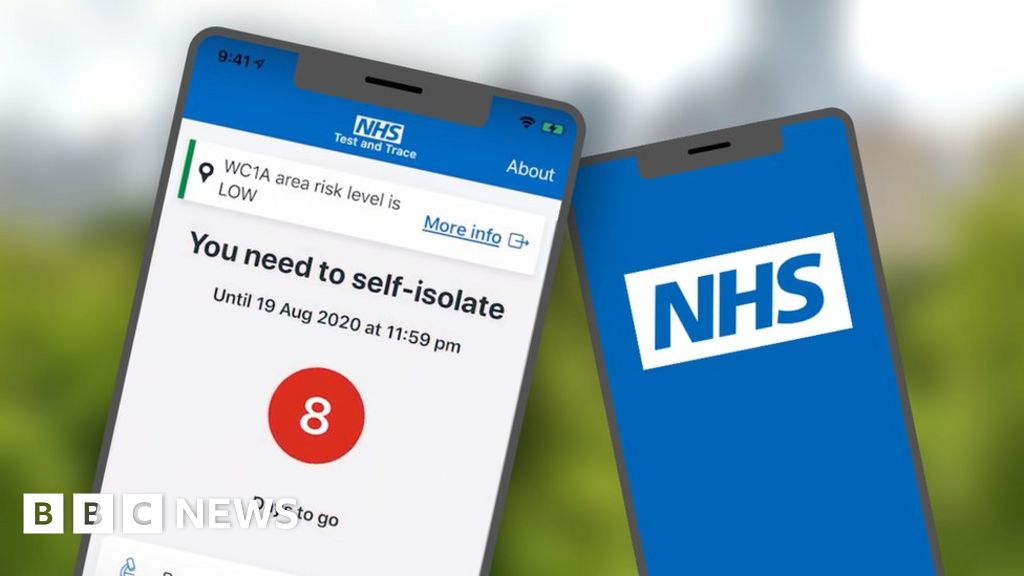
A trial of the English coronavirus app is getting under way.
It will be limited to residents in the Isle of Wight, the London Borough of Newham and NHS volunteer responders to begin with.
The app will be available in Apple and Google's online stores, but users will need to enter a code to activate it.
The software will tell users to self-isolate for a fortnight if the app detects they have been close to someone else diagnosed with the virus.
Baroness Dido Harding - who heads up the wider Test and Trace initiative - had earlier voiced concern about implementing the automated contact-tracing feature because of fears many people who had been falsely flagged might be told to go into quarantine.
The app has several other functions, including:
- An alert system that informs users of the coronavirus risk level close to their home, with the area defined by the first part of their postcode
- A QR barcode scanning facility, so users can check in when they visit a venue and be told if others there later tested positive
- A symptom-checking tool, which allows users to book a free test and get the results via the app
- A countdown function that comes into effect if they are told to self-isolate, so users can keep track of how long to stay at home
It initially works in five languages, with plans to add more soon.
The contact-tracing element of the software is based on Google and Apple's privacy-centric system.
The developers acknowledge there are still issues with measuring the distance between handsets, meaning some people will be incorrectly logged as being at high risk.
Official social distancing guidance says that two people should not be within 2m (6.6ft) of each other for 15 minutes or more.
But when trying to detect this, lab tests indicate:
- 31% of cases are missed when the handsets were within range
- 45% of cases are incorrectly flagged when the two handsets were in fact further apart
However, if the boundary is set at 5m, the accuracy rates radically improve.
Then the handsets detect each other in more than 99% of all cases, regardless of whether iPhones or Android devices were involved.
This is not useful in practice, but indicates the flaw that caused the original NHS Covid-19 app to be cancelled has been solved. That product often failed to detect cases involving two iPhones because of restrictions imposed on third-party software by Apple.
The team behind the new app acknowledges more work needs to be done to reduce the number of false positives and false negatives that occur at 2m, but is optimistic they can achieve this.
Part of the problem at present is that Apple and Google refuse to share the raw Bluetooth signal data involved.
While the two show no signs of backing down, they will shortly release a new version of their tool that should improve matters.
This development has also been welcomed by those involved with Switzerland's SwissCovid app.
"While the updated Google/Apple exposure notification API [application programming interface] still aggregates and shuffles data for privacy reasons, it will expose more information needed by the app to compute exposure more precisely," explained Prof Mathias Payer from the EPFL university in Lausanne.
https://news.google.com/__i/rss/rd/articles/CBMiLmh0dHBzOi8vd3d3LmJiYy5jby51ay9uZXdzL3RlY2hub2xvZ3ktNTM3NjUyNDDSATJodHRwczovL3d3dy5iYmMuY28udWsvbmV3cy9hbXAvdGVjaG5vbG9neS01Mzc2NTI0MA?oc=5
2020-08-13 13:20:48Z
CBMiLmh0dHBzOi8vd3d3LmJiYy5jby51ay9uZXdzL3RlY2hub2xvZ3ktNTM3NjUyNDDSATJodHRwczovL3d3dy5iYmMuY28udWsvbmV3cy9hbXAvdGVjaG5vbG9neS01Mzc2NTI0MA
Tidak ada komentar:
Posting Komentar